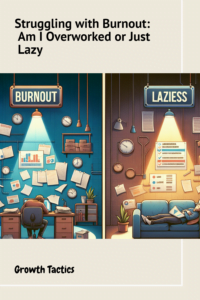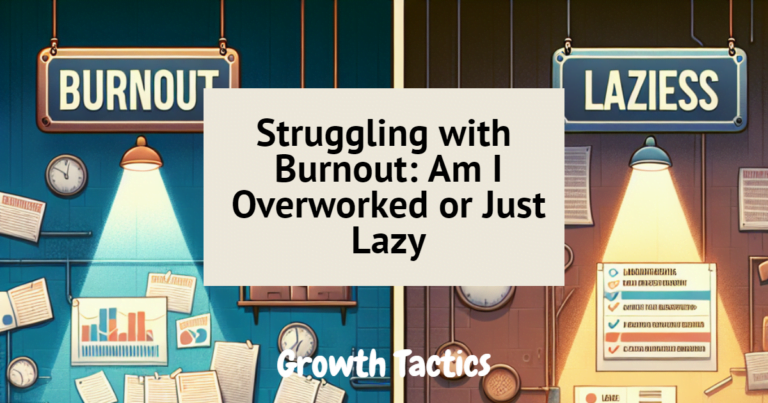We all have days when we feel exhausted and worn out, but have you ever wondered if there’s more to it than just needing a good night’s sleep? Sometimes, we might mistake being overworked for simply being lazy. It can be confusing to figure out what’s really going on when we’re feeling tired all the time. Let’s dive into the differences between overcoming burnout and feeling lazy.
Imagine this: You wake up in the morning, and even after a full night’s rest, you still feel like you could close your eyes and drift back to dreamland. Your body feels heavy, and the thought of getting up and moving around seems like a gigantic task. Does this sound familiar? It’s essential to understand why we feel this way and how to address it. Let’s explore more about tackling tiredness together.

Jump To Section
The Big Mix-Up: Am I Lazy or Just Overworked?
Have you ever felt too tired to do anything, but at the same time, you can’t tell if you’re just being lazy or if you’re experiencing burnout? Let’s take a closer look at how being overworked is different from laziness so you can figure out what’s going on.
Signs of Sitting Back or Slumping From Too Much?
When you’re feeling lazy, you might find yourself slouching a lot, avoiding tasks, or procrastinating. But if you’re overworked, you might still want to do things, but you’re just too exhausted to get them done. So, pay attention to whether you’re actively avoiding responsibilities or simply too drained to tackle them.
Mind and Body Messages: What Are My Feelings and Aches Telling Me?
Our bodies and minds often send us signals when we’re under too much stress. Feeling tired all the time, having constant headaches, or experiencing anxiety could all be signs that you’re pushing yourself too hard. While laziness might make you want to skip activities out of disinterest, being overworked can physically manifest in aches and pains that shouldn’t be ignored.
Cracking the Code: What Are Signs of Burnout?
In this section, we will explore the various signs of burnout in a way that is easy to understand and relatable to you.
Feeling Fried: When Your Energy Has Left the Building
Have you ever felt like your energy has just vanished, leaving you totally drained? That’s a common sign of burnout. It’s like when your phone battery is at 1% and you can barely keep your eyes open. Burnout can make you feel emotionally and physically exhausted like you’ve been running a marathon with no finish line in sight.
Not Caring as Much: When Your Fave Things Aren’t Fun Anymore
Imagine your favorite hobby or activity suddenly not bringing you joy anymore. It’s like your favorite video game feels boring, or you can’t find the excitement in playing with your friends. Burnout can make you lose interest in things you once loved, making everything feel dull and uninteresting. It’s important to recognize when this happens so you can take steps to recharge and find your spark again.
Solving the Slump: Tips to Overcome Burnout
When you’re feeling overwhelmed with a mountain of tasks, it can be helpful to break them down into smaller, more manageable parts. Instead of trying to tackle everything at once, focus on one task at a time. This approach can make the workload feel less daunting and help you make progress without feeling burnt out.
Asking for Help: It’s Okay to Not Do It All Alone
Remember, it’s okay to ask for help when you’re feeling overwhelmed. Whether it’s getting support from a teacher, parent, or friend, reaching out for assistance can lighten the load and prevent burnout. Working together with others can make tasks feel less daunting and more achievable.
Listening to Your Body and Mind: What Are They Asking For?
When you feel tired or unmotivated, it’s essential to tune in to what your body and mind are trying to tell you. Maybe you need some rest, a healthy snack, or a change of scenery. Take a moment to check in with yourself and see what you need to feel better.
Balance Is Key: Mixing Rest with Responsibility
It’s important to find a balance between taking breaks and completing your tasks. All work and no play can make you feel overwhelmed and exhausted. By allowing yourself some relaxation time in between responsibilities, you can recharge and come back more focused and ready to tackle your to-do list.
Understanding Overwork: How Too Much Work Affects You
Have you ever felt like your brain just won’t stop thinking? When you take on too much work, your mind can become overwhelmed with thoughts and ideas, making it hard to concentrate on anything. This can lead to feeling stressed, anxious, and even restless, as your brain tries to keep up with everything on your plate.
Tough on the Tummy: When Work Stress Hits Your Belly
Did you know that being overworked can also have physical effects on your body? Stress from too much work can cause stomachaches, indigestion, and even nausea. Your body reacts to the pressure you’re under by sending signals through your tummy, reminding you to take a break and relax. So if you find yourself with a queasy stomach while working, it might be a sign that you need to slow down and give yourself a breather.
Making Moves: Managing Laziness Effectively
Feeling a little lazy from time to time is completely normal, but it’s essential to know how to manage those moments and get back on track. Let’s explore some strategies to overcome laziness and keep yourself motivated.
Fun with Functions: Making Chores Enjoyable
Chores may not be the most exciting tasks, but there are ways to make them more enjoyable. You can turn on your favorite music while cleaning, challenge yourself to finish tasks faster, or even involve a family member or friend to make it a fun competition. Finding creative ways to approach chores can help make them more bearable and maybe even enjoyable!
Play, then Work: The Reward System
Rewards can be a great motivation to push through laziness and stay focused on your tasks. After completing a task or chore, treat yourself to something you enjoy, like watching a new episode of your favorite show, playing a game, or having a tasty snack. By giving yourself something to look forward to after completing your work, you can stay motivated and avoid procrastination.
Back to Basics: Simple Steps to Avoid Being Overworked
In our fast-paced world, it’s easy to get caught up in the hustle and bustle of daily life. But it’s essential to take a step back and ensure we’re not overworking ourselves. By adopting some basic habits, we can prevent burnout before it even begins.
ABCs of Saying No: It’s Alright to Turn Down Tasks
One of the most crucial steps in avoiding being overworked is to learn to say no when we feel overwhelmed. It’s okay to set limits on the amount of work we take on to ensure we don’t stretch ourselves too thin. Prioritizing our mental and physical well-being is paramount.
Time-Out Time: Importance of Regular Breaks
Many of us tend to push ourselves to keep going without taking breaks. However, regular short breaks throughout the day can significantly impact our productivity and prevent burnout. Taking time to rest and recharge allows our minds and bodies to refuel, ultimately boosting our efficiency and well-being.
Creative Calming: Fun Relaxation Techniques
When you’re feeling overwhelmed or stressed, grabbing some paper and crayons can be a great way to unwind. By doodling or creating art, you can express your feelings without needing to use words. Let your imagination run wild and see where your creativity takes you. Drawing can be a soothing and relaxing activity that helps take your mind off any worries.
Move and Groove: Shaking Stress Away with Dance
If you’re looking for a fun way to release tension and boost your mood, dancing is the perfect solution. Put on your favorite music and let your body move to the beat. You can dance around your room, have a dance party with friends or family, or even take a dance class. Moving your body and getting lost in the music can help you forget about any stress or pressure you may be feeling.
Recap: What We’ve Learned About Staying Balanced
In our journey to understand how to stay balanced and avoid burnout, we’ve covered a lot of ground. Let’s take a moment to recap the key points we’ve learned.
The Difference Between Lazy and Overworked
It’s essential to recognize the distinction between feeling lazy and being overworked. While laziness may stem from a lack of motivation or energy, being overworked can result from taking on too many responsibilities or tasks.
Identifying Signs of Burnout
We’ve discussed the signs of burnout, such as feeling emotionally drained, losing interest in activities you once enjoyed, and experiencing physical exhaustion. Recognizing these signs early on can help prevent burnout.
Strategies for Overcoming Burnout
To combat burnout, we’ve explored practical tips like breaking tasks into smaller steps and seeking help when needed. It’s crucial to prioritize self-care and take breaks when feeling overwhelmed.
Managing Moments of Laziness
Understanding when you need a break versus when laziness is creeping in is essential. By listening to your body and mind, you can strike a balance between rest and responsibility.
By incorporating these lessons into your daily routine and being mindful of your mental and physical well-being, you can maintain a healthy balance and avoid the pitfalls of burnout and laziness.


